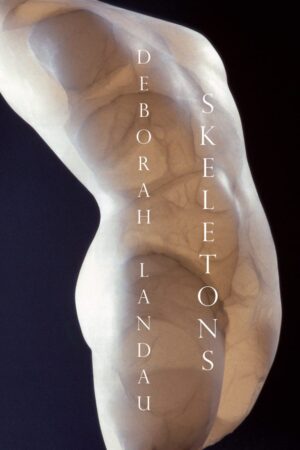Skeletons
by Deborah Landau
reviewed by Adam Scheffler
How can we savor the present knowing that we’re drawing ever nearer to suffering and death? In Skeletons, her fifth collection of poetry, Deborah Landau can’t seem to get away from this knowledge of impending horror. She knows we get “a sublime abundance—cherries, dog’s breath, the sun, then / (ouch) & all of us snuffed out” (“Skeleton”). Like Andrew Marvell, she hears “always dizzying near / with sour breath / time’s metric shhhh” (“Flesh”). She yearns to seize the day, yet distrusts that as a solution. Of sex she writes, “nectar, nabbed,” then “(As if!),” and finally, ruefully, “Any way outta this bag of bones?” (“Skeleton”). If we’re all drifting down a lazy river towards a cliff miles away, Landau knows just where we’re headed, despite the pretty scenery.
And yet, these morbid poems are also utterly delightful. Take the off-kilter and sardonic openings of the following poems, each one an acrostic entitled “Skeleton”:
Slot-machine cherries got nothing on these cherries, pure
kitsch such plush kerplunk big fruit energy*
Sorry not sorry, said death. He wasn’t fucking around, incessant
klepto.*
Sucker punched this morning by someone’s nostalgic yacht-rock playlist
kvelling a bit (memories!) trying to generate a little life fizz
energy-burst.
Landau loves “trying to generate a little life fizz” with her vocabulary and her poems often sucker punch us with their specific, absurd details (“nostalgic yacht-rock playlist”), her love of modern slang (“Sorry not sorry,” “big fruit energy”), Yiddishisms (“kvelling”), onomatopoeias (“kerplunk”), and made-up compound nouns (“life fizz energy-burst”).
Throughout the collection, death is always close at hand—two-thirds of the poems are eight-line acrostics that spell out the book’s title. But that doesn’t mean that the poems are dour or subdued. Rather, Landau turns up at the start of each poem like a dark magician with a bag full of tricks. Here’s the full version of one of the “Skeleton” poems quoted above:
Superluminal travel isn’t possible for humans, you said. It seemed
karmic. We were running toward abundance as if our livesdependedonit,
egads, but never fast enough. To fermata the present
lacuna was another way. An opposite approach—
embrace this day. You are transitory,
the world laughed. Oh yeah, we laughed back. So what?
Ovulating, while it lasted, was a blast, mainlining that Eros—
nectar, nabbed. (As if!) Any way outta this bag of bones?
Though the eight-line poem ends with the sense that we’re trapped in our bodies, it finds freedom in its inventive leaps from thought to thought. Again, Landau energizes her poem with her wide-ranging diction (“superluminal,” “egads”), but also with her sonic play (“lasted” and “blast”), interjections (“As if!”), and edgy refusal of self-pity. While Landau’s poems find relief from death in stylistic pleasures, they also seek relief in physical pleasure, particularly in sex, in a “zipper slinking in its silver, its long slide down.” In the collection, sex dangles the possibility of living life to the fullest. Though Landau worries that “Ecstasy belongs to the past, when twenty” (“Flesh”), the book ultimately ends with a call to “ravel together while we still have limbs” (“Ecstasies”). Landau can’t help but pledge her allegiance to sensory pleasures—chocolate, vodka, velvet—despite how much they remind her of loss.
Fittingly, then, Landau revisits the idea of seizing the day at the end of the collection as she describes returning to the world after the COVID lockdown. Her cramped one-room skeleton-poems, which often describe life under quarantine, rip open like a cocoon to make room for much longer, more full-throated and vulnerable concluding poems like “Ecstasies.” In “Flesh,” Landau becomes determined to savor the world that has been denied her, keenly aware of how easily it can be taken away:
let’s leave our apartments and go to the park
it’s a festival we want a popsicle some honeydew a break …Hello emptiness that is coming it will engulf
and then, a freighted woman I’ll fall back into my hole,
goodbye.
The word still appears throughout the collection; in its final pages, as Landau doubles down on trying to savor what’s left, she emphasizes its importance: “the catastrophe / though nearer is still not,” she writes in “Ecstasies,” then asks: “Are we done with life? I am still so into it.” In the end, seizing the day is too simplistic and hopeful a notion for this poet to ever subscribe to fully. Seizing implies possession, which means little when everything is ephemeral. Yet, at the same time, Skeletons ends with its repeated stills, and with a sense that if we don’t try to savor what’s left, we may waste our remaining days. Maybe we can’t seize the day, but Landau urges us to attune ourselves, while we can, to the present moment, in all its fullness and fragility. Invoking “grass stains, mosquito bites, biking at night,” the death-obsessed Skeletons makes us feel just how “precarious yes exquisite” they are.
Published on October 17, 2023

